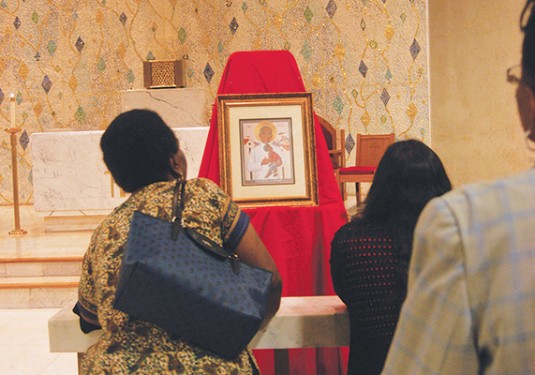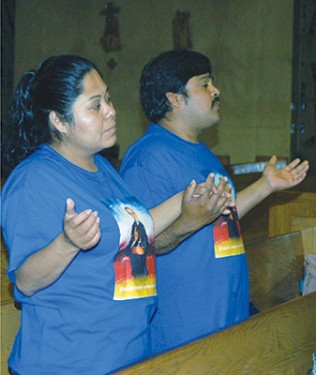
Neftaly Prudencia remembers when he was seven years old and his grandmothers turned on the radio every Sunday to listen to Salvadoran Archbishop Oscar Romero give his homilies.
“Monseñor Romero was the voice of the voiceless, the one who defended the poor,” Prudencia said.
As it is the case for many Salvadorans and people in the Americas, those homilies exhorting people to respect each other, build peace and love the poor left a mark on him.
He was one of 90 people who came to SS. Joachim and Anne Church, Queens Village, on Memorial Day to celebrate the beatification of Archbishop Romero, a martyr who was assassinated in 1980 while celebrating Mass.
Clad in shirts with an image of the priest, parishioners rejoiced in that Archbishop Romero became Blessed on Saturday, May 23 and is one step closer to sainthood. (More about Romero’s beatification.)
Blessed Romero, who a day prior to his assassination asked soldiers to stop killing innocent civilians, famously stood up for the poor and oppressed. He was one of the 70,000 who died during El Salvador’s civil war, which lasted from 1979 until 1992.

“In times of difficult coexistence, Archbishop Romero knew how to lead, defend and protect his flock, remaining faithful to the Gospel and in communion with the whole Church,” Pope Francis said in a letter written for the beatification. “Those who have Romero as a friend in faith find strength and courage to build the Kingdom of God.”
Father Robert Robinson, pastor, said that even though the Hispanic group at SS. Joachim and Anne is not the largest in the parish, the Salvadorans are very active.
“Many lived through the horrors of the civil war and Romero was a comfort” to them, he said.
Some have stories like Prudencia’s, ways in which Romero impacted them while growing up. Others never heard his voice, but his message of peace became part of the fabric of their families.
“We are all happy that our Monseñor Romero is called blessed; the devotion we have for him here is big,” said Roxana Garcia, whose uncle was among those killed during the Salvadoran civil war. “He was there, fighting for the people … He wanted us united because we are all God’s children.”
Romero’s words also struck a chord with other groups in the parish, like Colombians, Haitians and Uruguayans. When Father Robinson first came to the church, parishioners studied “The Violence of Love,” a book with the archbishop’s sermons.
“We found it to be one of the most profound spiritual books we read,” Father Robinson said, brimming with joy at the thought of Romero being beatified. “He just embodies, in a selfless way, the power of the social teaching of the Church.
“With the problems of the world today – difficulties in the Middle East, persecution to Christians – it is so easy to cave in and believe that violence is the solution. Monseñor Oscar Romero shows that there is more than that.”
Excerpts of Romero’s homilies were published in Spanish and French in the church’s bulletin, hoping that his example offers encouragement to all.
“He is a hero to me, he is a national hero,” said Deacon Jose Lizama, who emigrated from El Salvador in 1992 and was 16 when the country erupted into a civil war. “We have somebody interceding for us, especially for the marginalized.”
Lizama, who is assigned to St. Nicholas of Tolentine Church, Jamaica, added that he was impressed by the magnitude of the ceremony on May 23. Close to 300,000 people attended the beatification in El Salvador, in what could have been the largest religious gathering in Central America.
Advocated Respect
In his homily, Father Robinson echoed the joy of the parishioners and highlighted how Romero advocated for the respect of human dignity. “Romero is alive and reminds us that professing our faith forces us to be one with the whole world,” he said.
Father Robinson also read the sermon Blessed Romero gave the day before he was killed, where he asked the army to stop killing its brothers and sisters.
“He stood up for something much greater. He stood up for our religion, for peace in a time of crisis,” said Steven Sanabria, 17, a first-generation American born to Mexican parents. “He means a lot to our community.”
Sanabria added that Romero’s example encourages him and other youth to be passionate, vocal and resolved to defend the rights of the voiceless.
At the end of the Mass, Prudencia played a song dedicated to the archbishop while parishioners gathered at the front of the church to pray before an icon of Blessed Romero.
“I feel proud and we all feel a great joy, not just in El Salvador but around the world,” said Milagros Guerrero, a Salvadoran parishioner. “He is praying for world peace and especially for us who need his prayers.”
